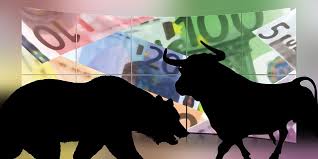It's only about five weeks until 2016. Stock market performance history shows these are typically good days for the Dow and S&P 500 - but this year could be different...
According to the Stock Trader's Almanac, the S&P 500 has averaged a 2% gain from Thanksgiving through the end of the year. The broad-based benchmark has been higher roughly 70% of the time, rising in 46 of those 65 periods.
 However, if the S&P 500 ends today in the red year to date, its performance for the rest of the year has historically deteriorated. It averages a 1.8% dip through the remainder of the year, according the Almanac. That has occurred 22 times over the last 65 years. The index has been higher 64% of the time.
However, if the S&P 500 ends today in the red year to date, its performance for the rest of the year has historically deteriorated. It averages a 1.8% dip through the remainder of the year, according the Almanac. That has occurred 22 times over the last 65 years. The index has been higher 64% of the time.
Heading into this Thanksgiving holiday, as of mid-day Wednesday, the index is up 1.55% for the year. The Dow is up 0.12%.
A couple other factors typically boost stocks in December...
What Stock Market Performance History Tells Us About December
Part of December's stock market performance is due to the seasonality effect. Looking at all Decembers from 1950 through 2014, the S&P 500 has risen 49 times and slipped 16. The average return has been 1.59%.
Motivating stock gains in December is the burst of special dividends and increased share buybacks frequently announced before the end of the year.
Additionally, "window dressing" usually helps boost stocks in December. Mutual funds and money managers are inclined to polish their portfolios before the end of the year. They'll buy winners and shed underperformers. This activity drives volume and sends stocks higher.
While the market could go higher a little longer, we're not sold on this being a solid rally until 2016...
Money Morning Capital Wave Strategist Shah Gilani told FOX Business' Stuart Varney while markets haven't pulled back yet, the Dow does not look as strong as others would have you believe.
[mmpazkzone name="in-story" network="9794" site="307044" id="137008" type="4"]
"As I've been saying, we have to get to 18,000 and hold there, otherwise we have a good chance of slipping back," Gilani said on "Varney & Co." this morning. "The fundamentals of the market are terrible. It just keeps going higher because there's nowhere else for the money to go."
And, the U.S. Federal Reserve is a wild card.
It's widely anticipated that the U.S. central bank will raise short-term interest rates off near zero next month. Such a move from the Fed will mark the first interest rate hike since June 2006.
Minutes from the Fed's October meeting signaled the Fed is prepared to act in December. Still, the pace of tightening is expected to be slow.
Stocks rallied after the October minutes were released on Nov. 18. The Dow, S&P 500, and Nasdaq gained 1.42%, 1.62%, and 1.79%, respectively.
Stay informed on what's going on in the markets by following us on Twitter @moneymorning or liking us on Facebook.
Did Saudi Arabia Just Shoot Itself in the Foot? Low oil prices mean less revenue for OPEC's wealthiest nation - and even though Saudi Arabia has hundreds of billions in the bank, two new developments will chip away at those savings faster than ever...
Related Articles:
- Reuters: Wall St. Rallies After Fed Minutes solidify December Rate Bets
- CNBC: Stocks Could Fade After Best Month in Four Years
- The Wall Street Journal: Market Data


